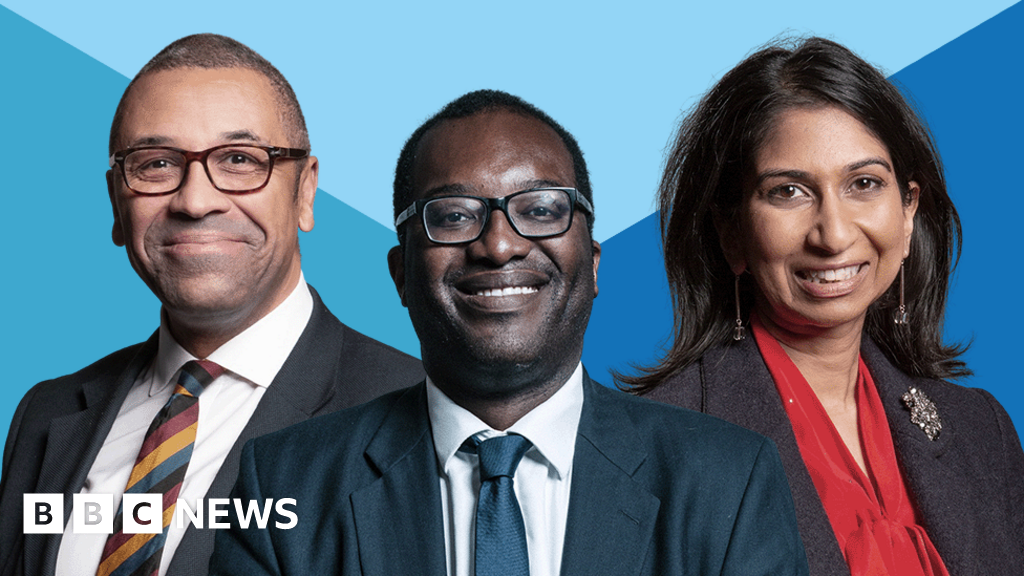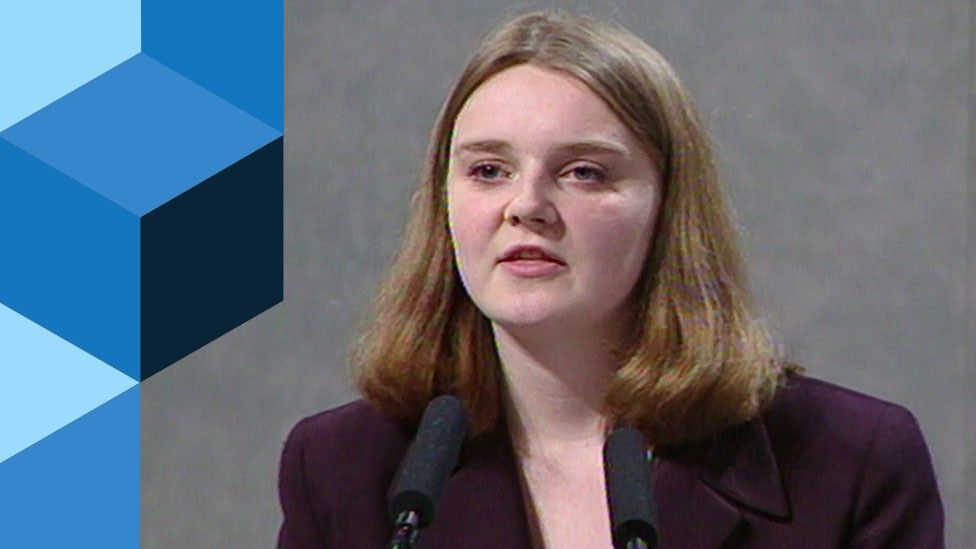Prime Minister Liz Truss has appointed her new cabinet, hours after taking over at 10 Downing Street.
For the first time none of the “great offices of state” is held by a white man, with Suella Braverman as home secretary, Kwasi Kwarteng as chancellor and James Cleverly as foreign secretary.
Here is a guide to the new faces and role changes.
Liz Truss’s cabinet
-
Liz Truss became prime minister on 6 September 2022, replacing Boris Johnson who was in post for slightly more than three years.
She was not the first choice of Conservative MPs – but she was the clear winner in a ballot of Tory members, who had the final say.
Truss has been a government minister since 2012, and held cabinet posts under David Cameron, Theresa May and Johnson, most recently as foreign secretary.
A Remain supporter at the 2016 EU referendum, who began her political journey at Oxford University as a Liberal Democrat, she is now an enthusiastic Brexiteer who has vowed to get back to traditional tax-cutting Tory values.
Truss, who has two children, was elected to Parliament as MP for South West Norfolk in 2010 after serving as deputy director of think tank Reform.
-
Thérèse Coffey has been appointed health secretary, taking over from Stephen Barclay who had only been in the role for two months, and will also be deputy prime minister.
The former work and pensions secretary is a long-time friend of Liz Truss and was closely involved in her leadership campaign.
Coffey, who was elected MP for Suffolk Coastal in 2010, previously served in a number of roles including environment minister, Commons deputy leader and assistant whip.
A devout Roman Catholic, she was asked about her views on abortion after the recent US Supreme Court ruling and said the law was not going to change in the UK – although she added she would prefer people not to have abortions.
The former Mars and BBC employee is a member of the Campaign for Real Ale with a love of karaoke, and lists her interests as watching football, gardening and music.
-
Kwasi Kwarteng is the new chancellor – so he’s now the man in charge of the economy.
The former business secretary is widely regarded as a close friend, as well as ally, of Liz Truss and his first big challenge will be her promised “mini-budget” and help with energy bills.
He all-but-confirmed his place in the cabinet days ago, writing in the FT in what appeared to be an attempt to reassure markets that the government would behave in a fiscally responsible way despite plans to borrow more money.
He’s been vocally supportive of nuclear power but has also championed introducing more renewables like onshore wind and solar farms with incentives like cheaper energy bills where there was local support.
Kwarteng, who got a scholarship to Eton and studied at Cambridge, worked in finance before his time in politics, and has written a book about the legacy of the British Empire.
-
James Cleverly is the new foreign secretary, taking over Liz Truss’s former department.
It won’t be a totally new department for him – he’s been a foreign minister before, for the Middle East and North Africa, and later for Europe and North America.
He most recently served as education secretary under Boris Johnson.
Cleverly was in the Territorial Army and went to Sandhurst and, outside of work, enjoys painting model soldiers and hanging out with his border terriers.
He’ll have a busy brief ahead as foreign secretary with the ongoing war in Ukraine and the UK government’s current plans to override parts of the Northern Ireland protocol – part of the Brexit deal agreed with the EU.
-
Suella Braverman has nabbed one of the “great offices of state” as home secretary, tasked with things like the plan to send some asylum seekers to Rwanda.
She’s a barrister who was previously the attorney general and ran to be the leader herself in the Tory leadership contest.
Her parents emigrated to the UK in the 1960s from Kenya and Mauritius, and both spent time in local politics – with her mother being a councillor for 16 years.
She has two children, studied law at Cambridge, and loves sushi.
Braverman was the first cabinet minister to take maternity leave – after the law was changed so that cabinet ministers could receive paid maternity leave, having previously been expected to resign their posts.
-
Ben Wallace remains the defence secretary, a post he’s held since July 2019.
While almost all the other posts have seen a big mix-up, this continuity was anticipated given he’s been leading the response to the war in Ukraine.
He’s popular with Tory members – and was once considered a favourite to replace Boris Johnson – but chose not to stand in the leadership contest.
While some of the characters in Truss’s new cabinet are more divisive in the Tory party, Wallace is pretty widely respected across the parliamentary party with many colleagues seeing him as a safe pair of hands.
During his eight-year spell in the Army, he served in Germany, Cyprus, Belize and Northern Ireland – where he helped thwart an IRA bomb attack.
-
Nadhim Zahawi has been a fast riser in the party – gaining support and public recognition in his role as vaccines minister during the pandemic.
As chancellor of the Duchy of Lancaster he’ll be responsible for running the Cabinet Office, the department that supports the prime minister and basically helps departments work together better on issues that involve more than one.
He’ll also be the equalities minister.
Zahawi was previously chancellor of the exchequer but for only two months – having been promoted when Rishi Sunak resigned – and pretty swiftly afterwards said Boris Johnson should resign.
He’s a former child refugee who fled Iraq with his parents in the 1970s and co-founded the market research firm YouGov. He is now believed to be one of the richest politicians in the Commons.
-
Simon Clarke has been promoted to the full cabinet as levelling up, housing and communities secretary, taking over from Greg Clark, who replaced Michael Gove in July.
He was previously chief secretary to the Treasury but chose to support Liz Truss for the leadership rather than his former boss Rishi Sunak.
The MP for Middlesbrough South and East Cleveland was previously a minister in the housing, communities and local government department and describes himself as a lifelong Boro fan.
Clarke, who has agoraphobia, is a qualified solicitor who worked as a policy specialist on health and education before being elected in 2017.
-
Jacob Rees-Mogg has been given the role of business (and energy) secretary and his appointment certainly signals the potential direction of travel for this government.
One of the Conservative Party’s highest profile Brexiteers – previously in cabinet as Brexit opportunities and government efficiency minister – he’s very pro-deregulation of business and wants to remove a host of rules and regulations post-Brexit.
He’s also been a critic in the past of what he’s called “climate alarmism” and has been very pro-fracking.
One of the first MPs to back Liz Truss for the leadership, Rees-Mogg set up his own investment management company in 2007, is a father-of-six, and describes himself as an avid cricket fan.
-
Kemi Badenoch has entered the cabinet as international trade secretary after surprising many by reaching the last four in the leadership contest.
The former minister in the Department for Levelling Up, Housing and Communities and equalities minister, who did not endorse any of her rivals in the leadership race, replaces Anne-Marie Trevelyan.
Badenoch, who has been outspoken on issues such as gender-neutral toilets which she opposes, stood on an “anti-woke” platform and argued for the state to be slimmed down.
The former software engineer worked in banking and later as a director of the Spectator magazine before being elected to the London Assembly.
She became MP for Saffron Walden in Essex in 2017, and lists her interests as including engineering and technology, social mobility and integration.
-
Chloe Smith replaces new Health Secretary Thérèse Coffey as work and pensions secretary.
She had been a minister in the department since September 2021 and was an early supporter of Liz Truss’s leadership bid.
In June 2021 the mother-of-two announced she had been given the all clear from breast cancer after her diagnosis the previous November and says she is now back to full health and full of energy.
A keen cyclist, Smith highlights her interest in transport and her work to help reduce youth unemployment in her constituency of Norwich North.
Before entering parliament in 2009 – following a by-election sparked by the resignation of the sitting Labour MP after the expenses scandal – she worked for accountancy and professional service firm Deloitte.
-
Alok Sharma will stay on as president for COP26, the 26th United Nations Climate Change Conference, working in the Cabinet Office.
This is pretty expected – as the role will expire soon.
But what will be interesting to watch is how he leaves when it does. He’s previously warned he would “quit” if the new prime minister scraps any of the UK’s commitments to net zero.
The new Business and Energy Secretary Jacob Rees-Mogg has previously expressed scepticism at the need to fight climate change, so this new working relationship will be one to watch.
-
Brandon Lewis is in the cabinet for a third time, this time in the role of justice secretary, replacing Dominic Raab.
The former Northern Ireland secretary, who resigned in July, initially backed Nadhim Zahawi for the leadership but endorsed Liz Truss at the start of August.
He had previously been party chairman and minister without portfolio in Theresa May’s cabinet and served as a minister in several departments under May, David Cameron, Boris Johnson.
A qualified barrister and former company director, Lewis was a borough councillor in Brentwood for 10 years – five as leader – before entering parliament.
The father-of-two, who became Great Yarmouth MP in 2010, took up triathlon the year after he was elected and has completed two London Marathons.
-
Kit Malthouse replaces new Foreign Secretary James Cleverly as education secretary.
The former chancellor of the Duchy of Lancaster, responsible for running the Cabinet Office, did not say who he was supporting in the leadership race.
He came to the fore in the Brexit debate, when his name was put to a so-called compromise plan to replace Theresa May’s proposed Northern Ireland backstop with “alternative arrangements”.
Malthouse was a deputy mayor of London from 2008, serving under Boris Johnson, and became MP for North West Hampshire in 2015.
A chartered accountant who has run a number of small businesses, the father-of-three lists his interests as including gardening, reading and watching modern dance.
-
Ranil Jayawardena has become environment secretary, taking over from George Eustice.
He was previously a minister in the international trade department, working for Liz Truss before she became foreign secretary, and was an early supporter of her leadership bid.
Jayawardena, who has three children, used to work for Lloyds Bank and was also a councillor in Hampshire.
He entered the Commons as MP for North East Hampshire in 2015.
-
Anne-Marie Trevelyan has become transport secretary, replacing Grant Shapps.
She had previously been international trade secretary, replacing Liz Truss in the role in 2021, and before that had been international development secretary but lost her place in the cabinet when the department was scrapped.
An outspoken Brexiteer who resigned from a previous junior ministerial role in 2018 in protest at Theresa May’s Brexit withdrawal deal, she supported Truss in the leadership race.
The former chartered accountant entered the Commons as MP for Berwick-upon-Tweed in 2015 and describes herself as having a passion for singing.
-
Chris Heaton-Harris has been promoted to the cabinet as Northern Ireland secretary, replacing Shailesh Vara who only took on the role in July.
The former chief whip’s new position was one that initially proved hard to fill, and certainly is regarded by some as a bit of a poisoned chalice right now – the nation is currently without a functioning devolved government.
One of his key priorities will be resolving tensions over the Northern Ireland protocol – part of the Brexit deal that Liz Truss wants to override – which the DUP has argued is necessary if it is to re-enter into power sharing in Northern Ireland.
The qualified football referee describes himself as a fierce Eurosceptic but may well need to engage with the EU in negotiations about this.
Before becoming a politician, Heaton-Harris ran his family’s wholesale fruit and vegetable business in New Covent Garden Market.
-
Alister Jack remains secretary of state for Scotland in Liz Truss’s first cabinet, a role he has held since Boris Johnson became prime minister in 2019.
The former government whip did not reveal who he supported in the leadership contest.
Before entering parliament as MP for Dumfries and Galloway in 2017, Jack was a businessman who founded tent-hire and self-storage companies.
Jack, who has three grown up children, is also a dairy farmer and grows Christmas trees.
-
Robert Buckland remains secretary of state for Wales, continuing in the role he took on after Simon Hart’s resignation in July.
The former barrister had previously been in the cabinet, as justice secretary, between July 2019 and September 2021 and is also a former solicitor general.
He previously backed Rishi Sunak for Tory leader, before switching to Liz Truss, which made him some foes among Sunak’s camp who accused him privately of serving his own interests.
He is Welsh, born in Llanelli, but represents a seat in South Swindon rather than in Wales – which isn’t usual practice and could prove controversial.
Buckland has twin children and says his interests include music, wine, political history and watching rugby and cricket.
-
Penny Mordaunt has returned to the cabinet as leader of the House of Commons, responsible for delivery of the government’s legislative programme, replacing Mark Spencer.
She endorsed Liz Truss after nearly beating her into the final two of the Conservative leadership race.
Most recently a trade minister, the naval reservist made history when she became the UK’s first female defence secretary in 2019 and had also been in cabinet in 2017 as international development secretary.
The former magician’s assistant is perhaps best known outside Westminster for appearing on ITV’s celebrity diving show Splash!
Before becoming MP for Portsmouth North in 2010 she was a press officer for Kensington and Chelsea Council and the Freight Transport Association, and a director of the Big Lottery Fund and Diabetes UK.
-
Lord True has been named leader of the House of Lords, responsible for delivery of the government’s legislative programme in the Upper House.
A former Cabinet Office minister, he replaces Baroness Evans who had held the position since 2016.
Before being made a life peer in 2010, True had been leader of the London Borough of Richmond upon Thames and before that had worked in John Major’s policy unit when he was prime minister.
A fluent Italian speaker, who has previously lived and studied in the country, he lists his interests as including history, gardening and sport.
-
Michelle Donelan has been appointed culture secretary, giving her a second chance to make her mark in cabinet following her resignation two days into the job of education secretary in July.
The former higher and further education minister replaces Nadine Dorries, having backed Liz Truss after initially supporting her former boss Nadhim Zahawi and then Penny Mordaunt in the leadership race.
Previously a government whip, Donelan worked in the media and entertainment industry before entering parliament, including a period as communications manager at professional wrestling firm WWE.
The MP for Chippenham, first elected in 2015, says she enjoys walking her dog in her limited spare time.
-
Jake Berry is the new minister without portfolio and Conservative party chairman, replacing Andrew Stephenson.
He will be responsible for trying to gear the party up for the next election – Stephenson’s predecessor Oliver Dowden resigned after a bruising set of by-elections for the Conservative party earlier this year.
Berry will have to engage with Tory associations around the country (some of which weren’t particularly happy at Boris Johnson’s ousting), and help unite the party after months of infighting.
He was previously Northern Powerhouse minister and has been chairman of the Northern Research Group, representing many of the Tory MPs who won seats in traditional Labour heartlands in 2019.
The group, and Berry in particular, have pushed the government repeatedly on what it is doing to “level up” and invest in those kinds of areas, which will likely form a big part of any future election strategy of his.
-
Wendy Morton has been appointed chief whip, responsible for party discipline and ensuring Conservative MPs vote along party lines, and will attend cabinet.
The former assistant whip backed Liz Truss at the start of the leadership contest and replaces Chris Heaton-Harris in the role.
Morton, who has also been a transport and Foreign Office minister, says her interests include walking, cookery, art deco and ceramics.
She was first elected MP for the West Midlands constituency of Aldridge-Brownhills in 2015, having missed out to Truss’s rival Rishi Sunak in a bid to become the party candidate for Richmond in 2014.
-
Chris Philp has been appointed chief secretary to the Treasury, attending cabinet, and takes over from new Levelling Up Secretary Simon Clarke.
The former digital minister initially backed Sajid Javid in the leadership race but endorsed Liz Truss in July.
Philp, who has also held junior roles in the Home Office and Ministry of Justice, has spoken of how the NHS saved the lives of his twins after they were born very prematurely at 25 weeks.
He was elected MP for Croydon South in 2015.
-
Michael Ellis has been appointed attorney general – the chief legal adviser to the government – and can attend cabinet.
He replaces new Home Secretary Suella Braverman, having previously filled in for her when she went on maternity leave in 2021.
A former Cabinet Office minister and paymaster general, Ellis supported Liz Truss’s rival Rishi Sunak in the Conservative leadership race.
Ellis worked as a barrister for 17 years before entering parliament and his legal experience has previously led to him getting the role of solicitor general for England and Wales in 2019.
He was elected MP for Northampton North in 2010.
-
Edward Argar will attend cabinet after being named paymaster general and Cabinet Office minister, replacing new Attorney General Michael Ellis.
The former health minister, who resigned in July, supported Liz Truss in the leadership race after initially backing ex-Health Secretary Sajid Javid.
Before entering parliament he worked in management consultancy and communications at various companies including outsourcing firm Serco and was a city councillor in Westminster.
He has been MP for Charnwood since 2015 and lists his interests as including gardening, tennis and watching cricket.
-
Vicky Ford has become development minister at the Foreign Office and will attend cabinet.
The former MEP and South Cambridgeshire local councillor was an early supporter of Liz Truss in the leadership race.
Before entering politics she worked as managing director of an international bank and was involved in raising money for infrastructure projects in Europe, the Middle East and Africa.
Ford, who has three children, was elected MP for Chelmsford in 2017 and lists her interests as including cricket, fly fishing, gardening and singing.
-
Tom Tugendhat will attend cabinet as security minister in the Home Office, after reaching the final five in the Conservative leadership race.
The former Territorial Army officer, who served in Iraq and Afghanistan, has been chairman of the Foreign Affairs Select Committee since 2017 but this is his first ministerial post.
His backing of Liz Truss after being eliminated from the leadership race was surprising to many in the Conservative party – given he’s always been considered part of the more “centrist” One Nation group of Tory MPs.
Tugendhat will now sit in a government largely skewed to the right-wing of the party.
He was highly critical of the withdrawal from Afghanistan by Western forces in 2021, and of Boris Johnson during his premiership, but now he’s in a government role his outspoken interventions are likely to be toned down.
-
James Heappey will continue as minister for the armed forces, and take on the veterans brief, in the Ministry of Defence.
He’ll now attend cabinet too though – the top table of government ministers.
He’s a former soldier who spent 10 years in the Army, serving in Afghanistan, Iraq and Northern Ireland, and his profile rose significantly during the UK’s withdrawal from Afghanistan and more recently the Ukraine war.
He’s considered a strong communicator and he, like his boss Ben Wallace who is staying on as defence secretary, does seem to bridge divisions across the Tory party factions.
Heappey describes himself as a very keen sportsman who also loves to cook.
-
Graham Stuart has become climate minister in the business department and will also attend cabinet.
The former Foreign Office and international trade minister, who has also been a government whip, supported Liz Truss in the leadership race.
He describes himself as a keen cyclist and says his interests include football, economics, motorcycling and punk rock.
Stuart, who set up a publishing business after leaving university, was first elected MP for the East Yorkshire constituency of Beverley and Holderness in 2005.
Newcomers includes ministers who did not attend the most recent cabinet.
Click here if you cannot see the Cabinet Guide

There was quite a big turnover in Ms Truss’s reshuffle, with several high-profile members of the previous cabinet leaving. The replacements include 13 new members who have taken up cabinet roles for the first time.
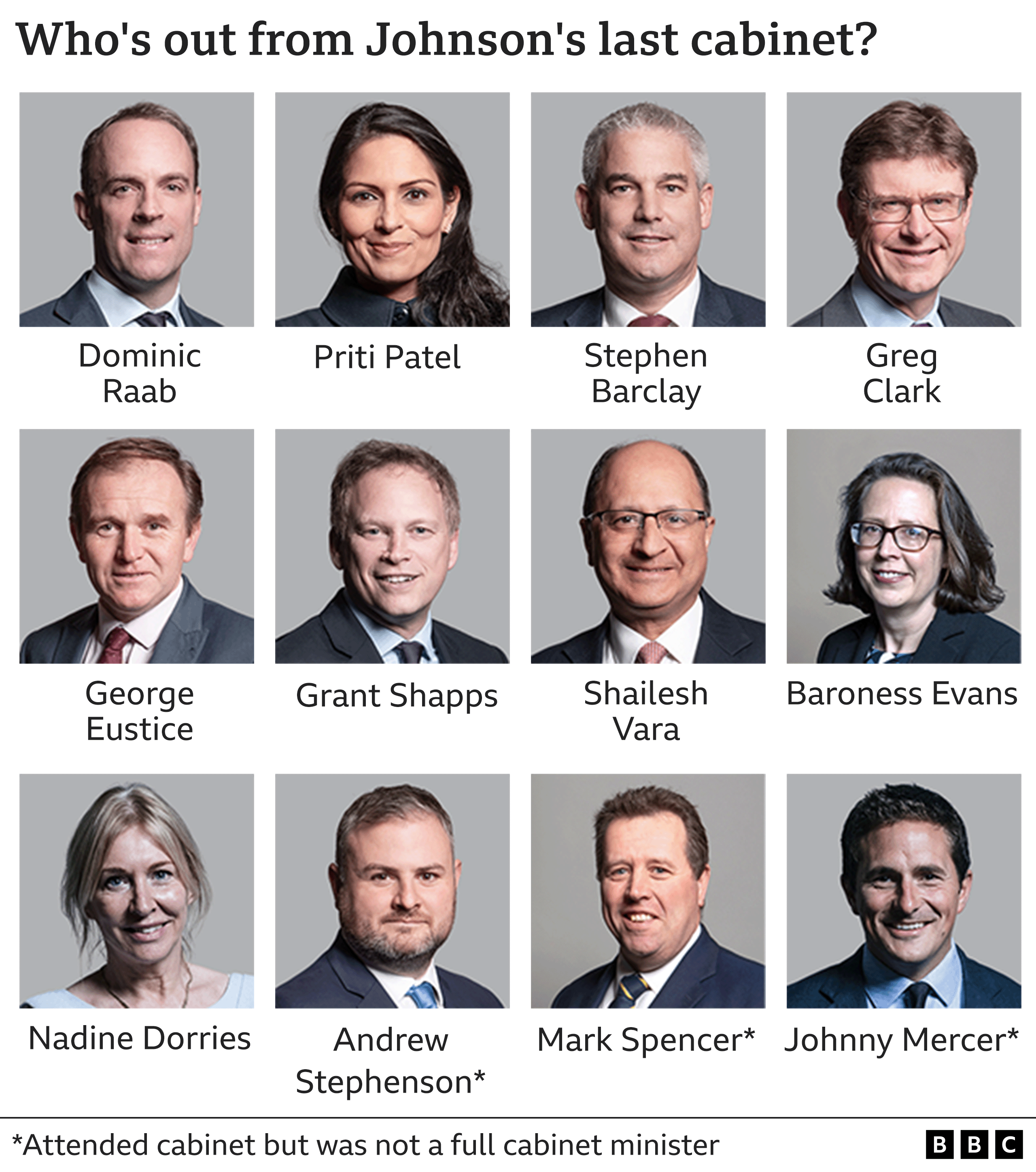
After all the comings and goings, there are now two more women serving in the cabinet than there were under Boris Johnson, taking the total to nine. That makes up 30% overall, which is the same as the first cabinets under Gordon Brown and Theresa May.
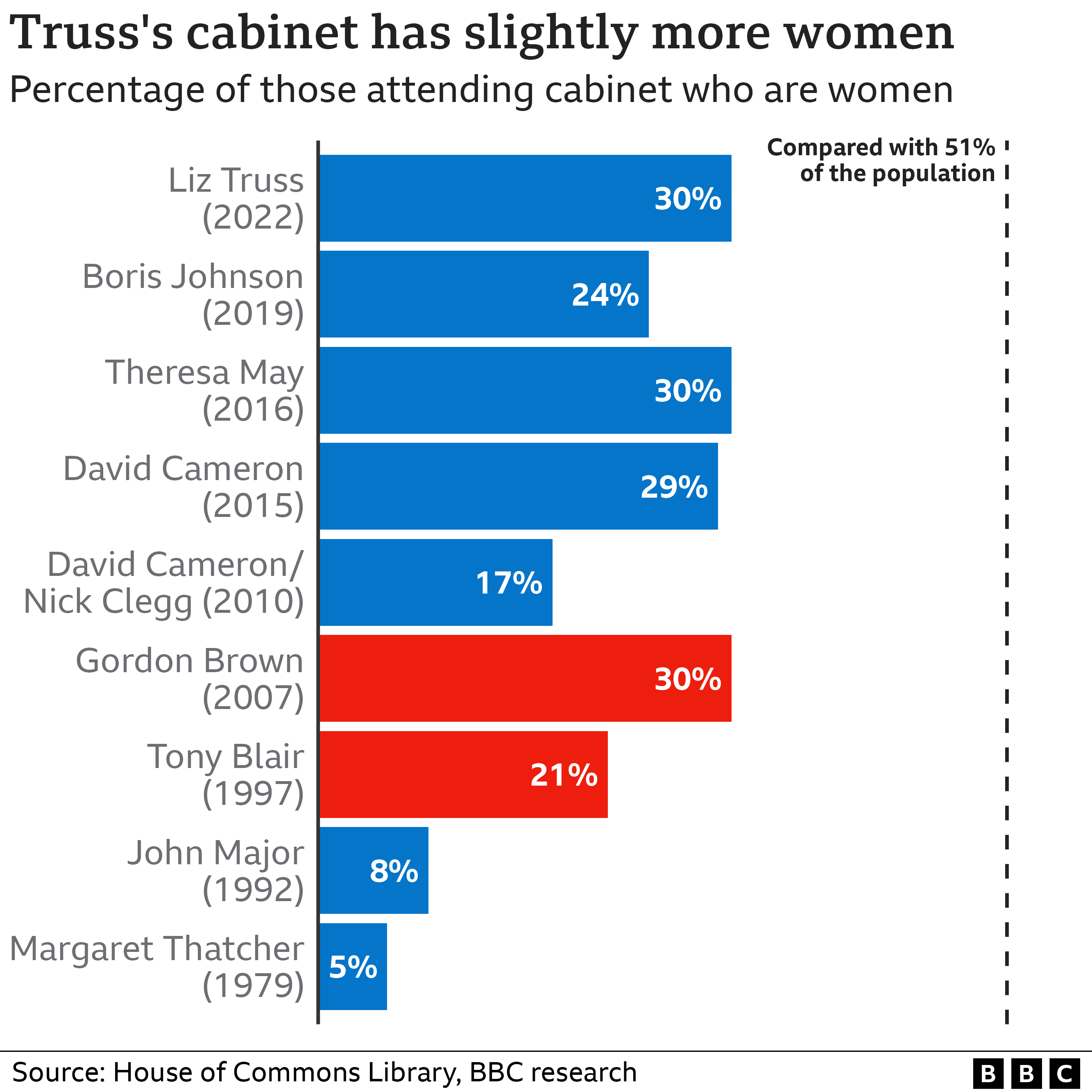
As for the education of those assembled by Ms Truss, 68% of them went to private schools, up slightly when compared with Mr Johnson’s 2019 cabinet and up greatly when compared with Theresa May’s in 2016.
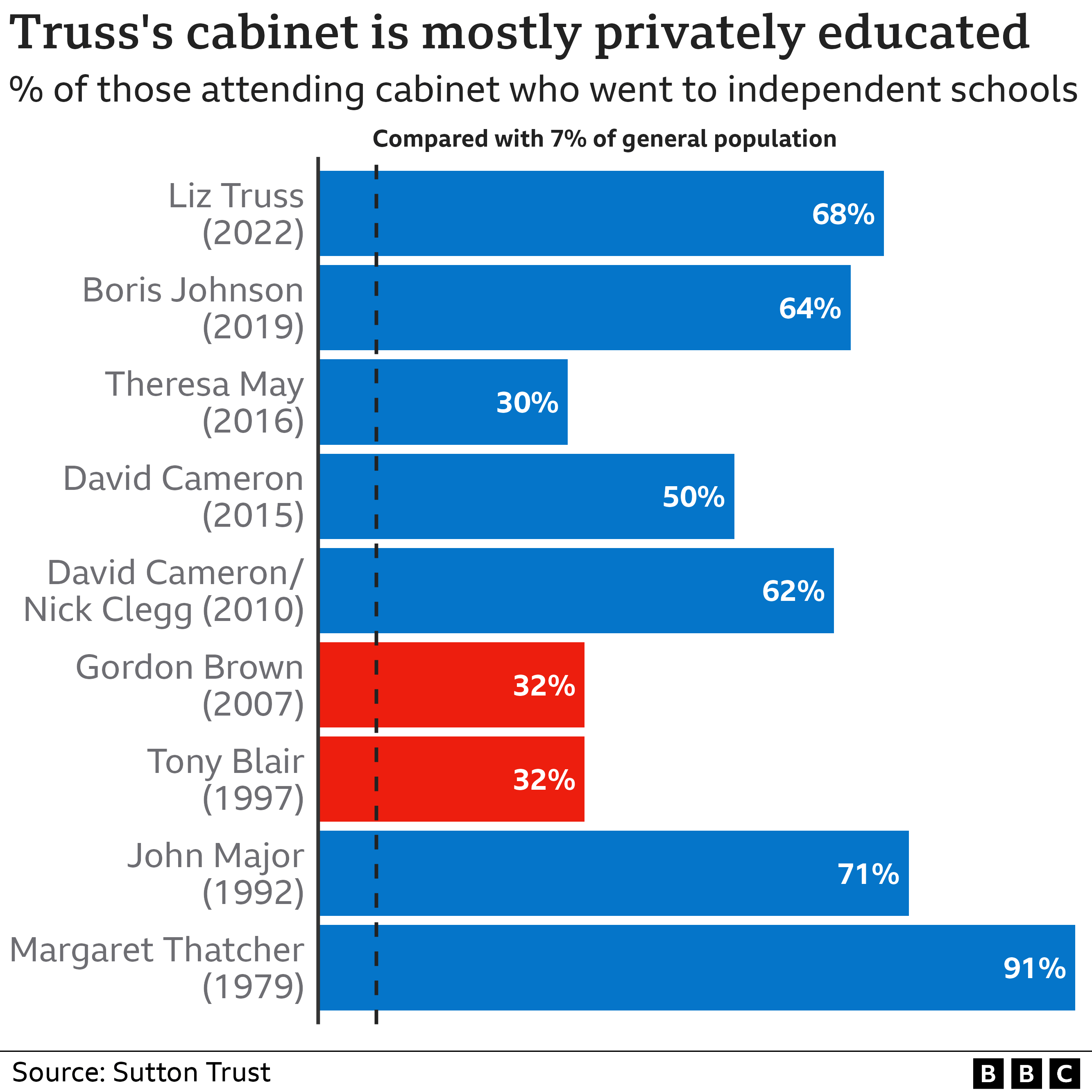
At 35%, Ms Truss’s new cabinet has the lowest proportion of members who were educated at Oxford or Cambridge since Tony Blair’s first cabinet in 1997.
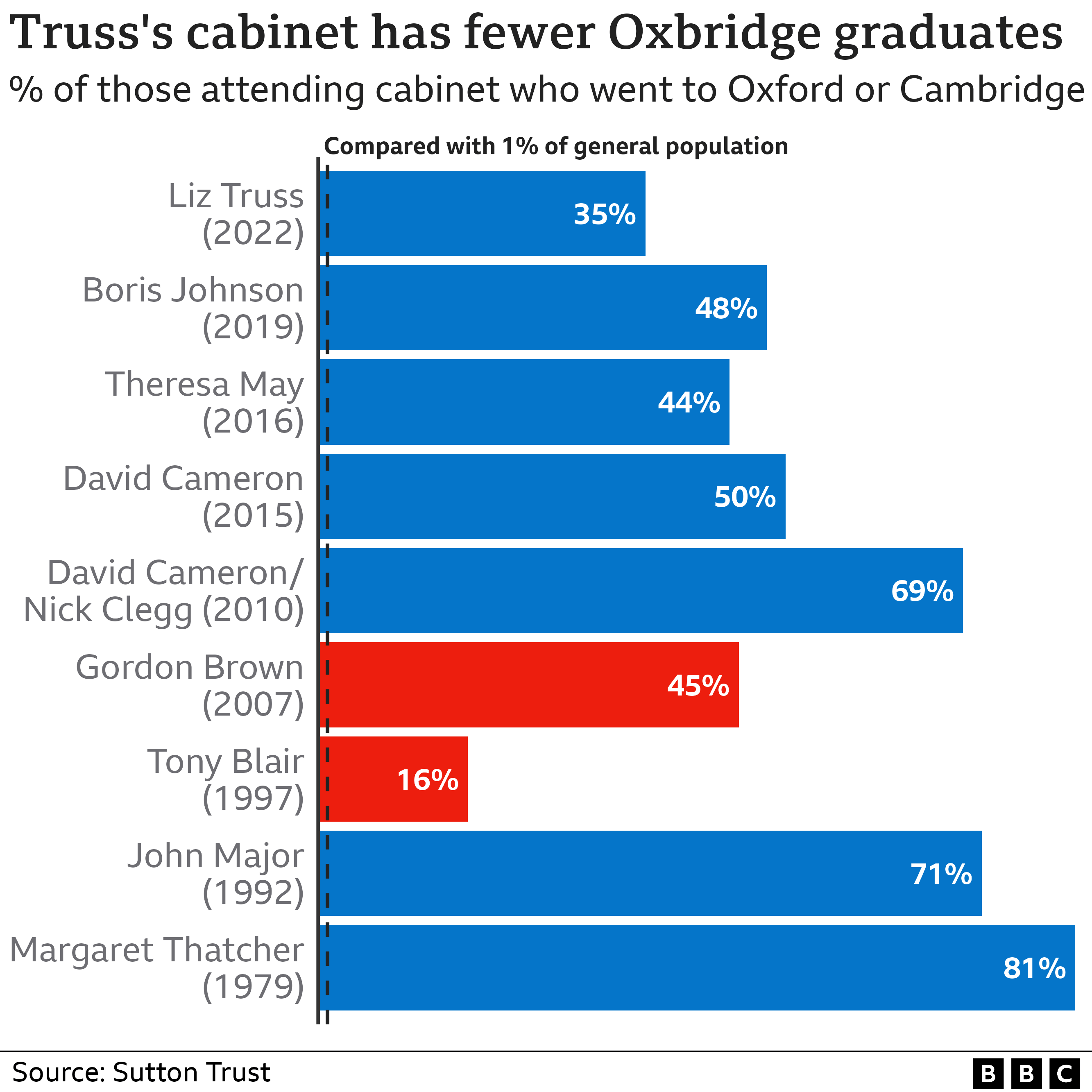
-
-
2 days ago
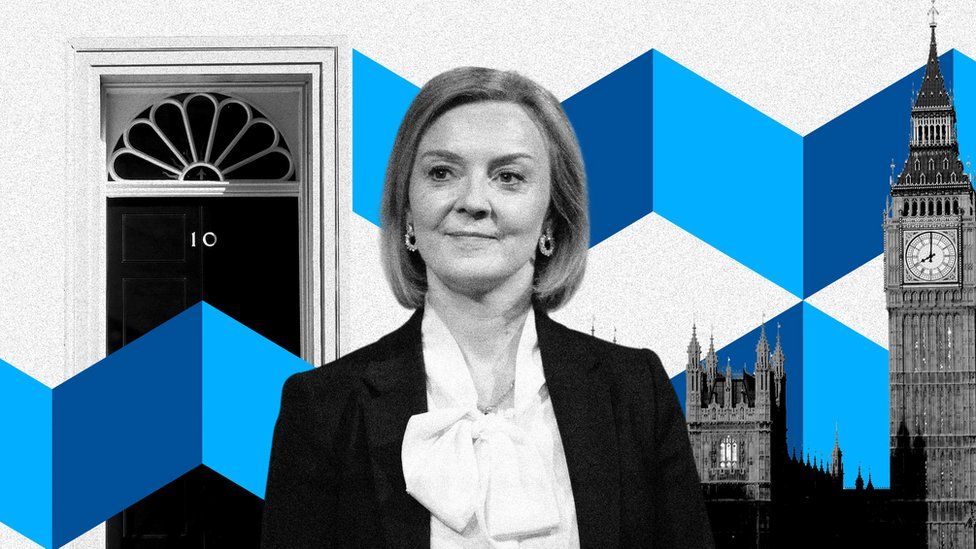
-
-
-
2 days ago
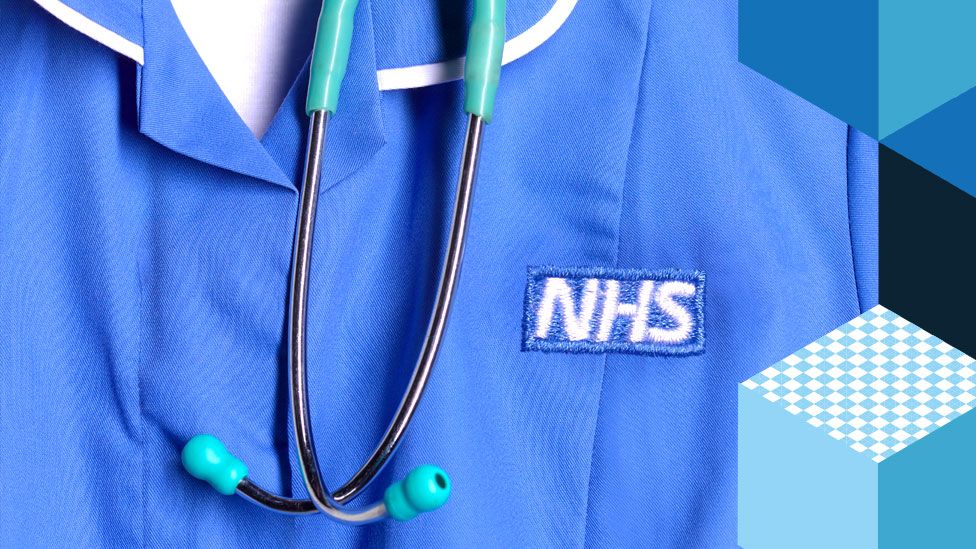
-
-
-
3 days ago
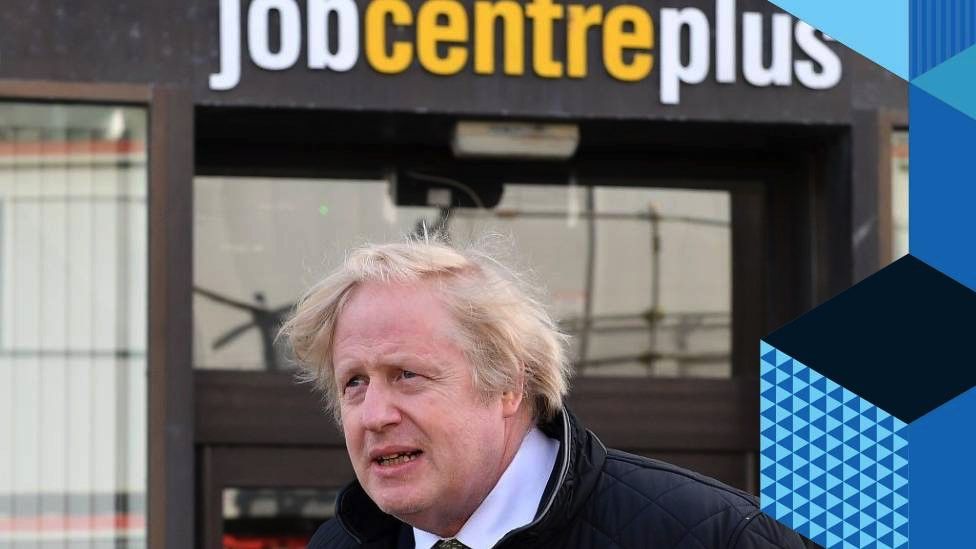
-
